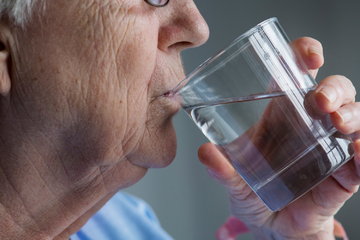FIND OUT WHY YOU HAVE DRY MOUTH HERE
About Dry Mouth

FIND OUT WHY YOU HAVE DRY MOUTH HERE
SIGNS AND SYMPTOMS
Continual need for drinks
Dry and cracked lips
Continual need for drinks
Dry and cracked lips
Increased plaque
Increased decay in the tooth
WANT HELP WITH RELIEF FROM DRY MOUTH?
CONTACT US NOW 1300 790 139 | EMAIL
FIND OUT WHY YOU HAVE DRY MOUTH HERE
Cause
Common causes of dry mouth include drug therapy, systemic disease, and radiation therapy.
Anticonvulsants
Tricyclic Antidepressants
Diuretics
Antihistamines
Beta-Blockers
Hypothyroidism, Lupus, Diabetes
Alzheimer’s Disease
Parkinson’s Disease
Radiotherapy (particularly radiation to the head and neck)
Dehydration (From Burn, Vomit and Diarrhoea)
Smoking
Alcohol and Caffeine intake
Prevention
Good hydration and nutrition are vital to help decrease the severity of dry mouth.
Stopping smoking and limiting alcohol and caffeine drinks can also help to prevent dry mouth and the consequences of dry mouth.
Treatment And Management
Determining and correcting the underlying cause of dry mouth is the best way to treat xerostomia however, this may not always be possible.

Dry mouth can be managed by stimulating salivary gland. This can be achieved by sucking sugarless loollies or chewing gum. Medications may also be prescribed which can stimulate saliva production and increase its flow, but they can have many adverse effects and contraindications. Please check with your doctor.
Saliva substitutes and lubricants such as spray, mouthwashes, gels and liquids are available in many pharmacies. These can be used as often as needed to help manage symptoms of dry mouth.
WHAT CAN YOU DO?
Consult your physician and pharmacist about managing the effects of medication and medical treatments
Sip water and sugar free drinks regularly
Eat moist food (e.g., use gravies, sauces)
Do not smoke or use tobacco
Use humidifier if air is dry particularly at night
Practice oral and dental hygiene regularly
Suck on sugar free or hard candy to stimulate saliva flow (e.g, cinnamon or mint-flavoured candies).
Avoid mouthwashes containing alcohol or peroxides
Limit alcohol and caffeine intake
IF YOU THINK YOU HAVE DRY MOUTH CONSULT YOUR DOCTOR, DENTIST OR PHARMACIST.
If commercial products or current medications are not effectively treating or managing your symptoms, we can work with your GP to tailor the therapy to your needs.
GET SOME FREE ADVICE, SPECIFIC TO YOUR CONDITION BELOW
References
- Greenspan, D 1996, ‘Xerostomia: Diagnosis and Management’, Modern Medicine Network, vol. 10, no. 3.
- National Institutes of Health 2014, Dry Mouth, U.S. Department of Health and Human Services, Viewed 16 January 2018, < >.
- Olver, IN 2006, ‘erostomia: a common adverse effect of drugs and radiation’, Australian Prescriber, vol. 29, no. 4, pp. 97-98.
- Joanna, ND &Thomson, WM 2015, ‘Dry mouth – An overview’ Singapore Dental Journal, 36, no., PP. 12-17
